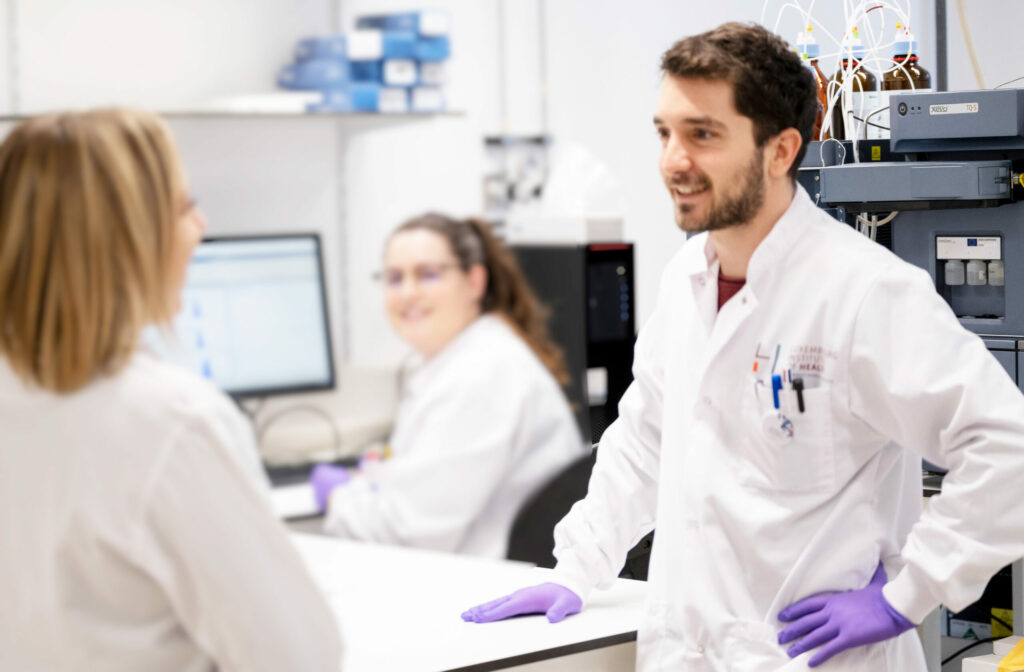
Immune Endocrine and Epigenetics
The Immune Endocrine and Epigenetics focuses on the molecular mechanisms underlying the environmental control of phenotype development.
Activities
Stress represents the single most important cause of disease, causing costs as high as 3-4 % of the European GNP, and up to 60% of all work-days lost to disease. Many of these diseases are related to infections and aberrant immune reactions. Our interest is in elucidating genetic, epigenetic, transcriptional, translation and post-translational mechanisms underlying environmental control of the stress reaction, particularly within the negative feedback loop of the HPA (hypothalamic–pituitary–adrenal) axis.
The main goal of our research is to understand the molecular mechanisms underlying the environmental control of phenotype development, in the HPA axis and in the immune system.
Collaborations:
- “Forschungsinstitut für Psychobiologie des Stresses” University Trier
- Research Unit INSIDE, University of Luxembourg
- Leiden-Amsterdam Centre for Drug Research (LACDR)
- Department of Periodontology University of Oslo & Department of Medical Psychology, Bergen, Norway
- Luxembourg Centre for Systems Biology (LCSB)
- Luxembourg Immune Mediated Inflammatory Disease Research Association (LIMIDRA)
- ZithaKlinik, Luxembourg
- Proteome and Genome Research Unit, LIH.

Turner
Projects & clinical trials
Some of the group’s research projects include:
- EpiPath – Severe childhood adversity is thought to be one of the strongest risk factors for three major public health problems: cardiovascular disease, upper respiratory tract infections (URTI) and mental health problems. The principal interface between the environment and the genome is epigenetic methylation of genomic DNA. Our working hypothesis is that early life adversity induces high-risk epigenetic modifications. A cohort of young adults that experienced poor early life conditions are currently being recruited.
- MetCOEPs -Environmentally induced epigenetic modifications are set in place many years before the associated type 2 diabetes, major depression, schizophrenia, hypertension and cardiovascular diseases becomes detectable. MetCOEPs looks at how these entirely natural modifications to our genome influence the activity of the associated genes, and the proteins they produce. Understanding this cascade of events will allow us to better understand how our environment influences our wellbeing, and to understand how these epigenetic markers can be used to identify people at risk of many diseases, allowing for suitable early interventions that reduce the eventual disease risk.
- ESPoiRe – Although rheumatoid arthritis (RA) treatment options have improved significantly over recent years, we cannot currently predict which therapeutic option would suit individual patients leading to the current “trial and error” treatment approach “testing” patients for clinical efficacy drug by drug. Preliminary evidence suggests a large role for DNA methylation in RA. Together with Luxembourg rheumatologists we will generate epigenomes from clear clinical phenotypes, and further develop the LUXIMID register together with LIMIDRA and the LCSB to improve patient stratification and treatment choice.
Featured team members
Scientific publications
-
Co-occurrence of memory impairment and fatigue distinguishes post COVID from pandemic-related health effects in the 4-year CON-VINCE cohort study – 27/10/2025
-
Core fucosylation of IL-2RB is required for natural killer cell homeostasis – 02/08/2025
-
Maternal birth experience and DNA methylation – 21/05/2025
-
Developmental epigenomic effects of maternal financial problems – 01/05/2025
-
Pollution, stress response, and obesity – 01/05/2025
-
Tetrahydrobenzimidazole TMQ0153 targets OPA1 and restores drug sensitivity in AML via ROS-induced mitochondrial metabolic reprogramming – 07/04/2025
-
Heterogeneous expression of the atypical chemokine receptor ACKR3 in glioblastoma patient-derived tissue samples and cell cultures – 01/12/2024
-
A critical review to identify data gaps and improve risk assessment of bisphenol A alternatives for human health – 22/10/2024
-
Patient-based multilevel transcriptome exploration highlights relevant chemokines and chemokine receptor axes in glioblastoma – 30/09/2024
-
Corrigendum to “Case-co-twin studies as a methodology to examine the adversity immunophenotype while excluding genetic effects – 01/10/2024
Related News

Job vacancies
There are no jobs matching this page at the moment. You can view all jobs via the button below.





